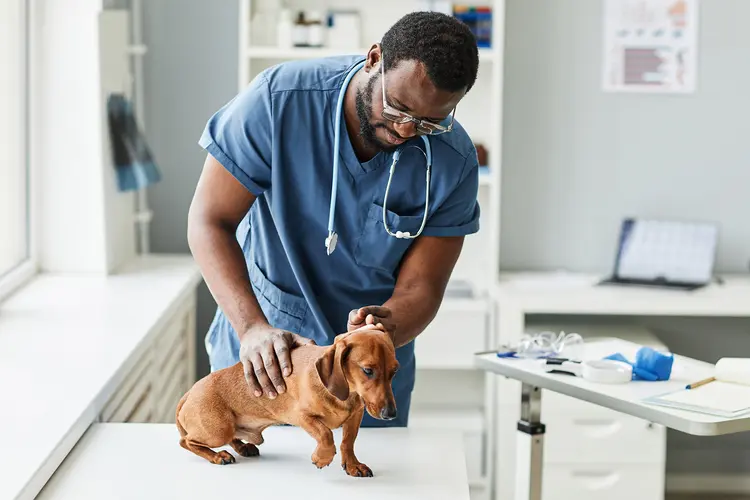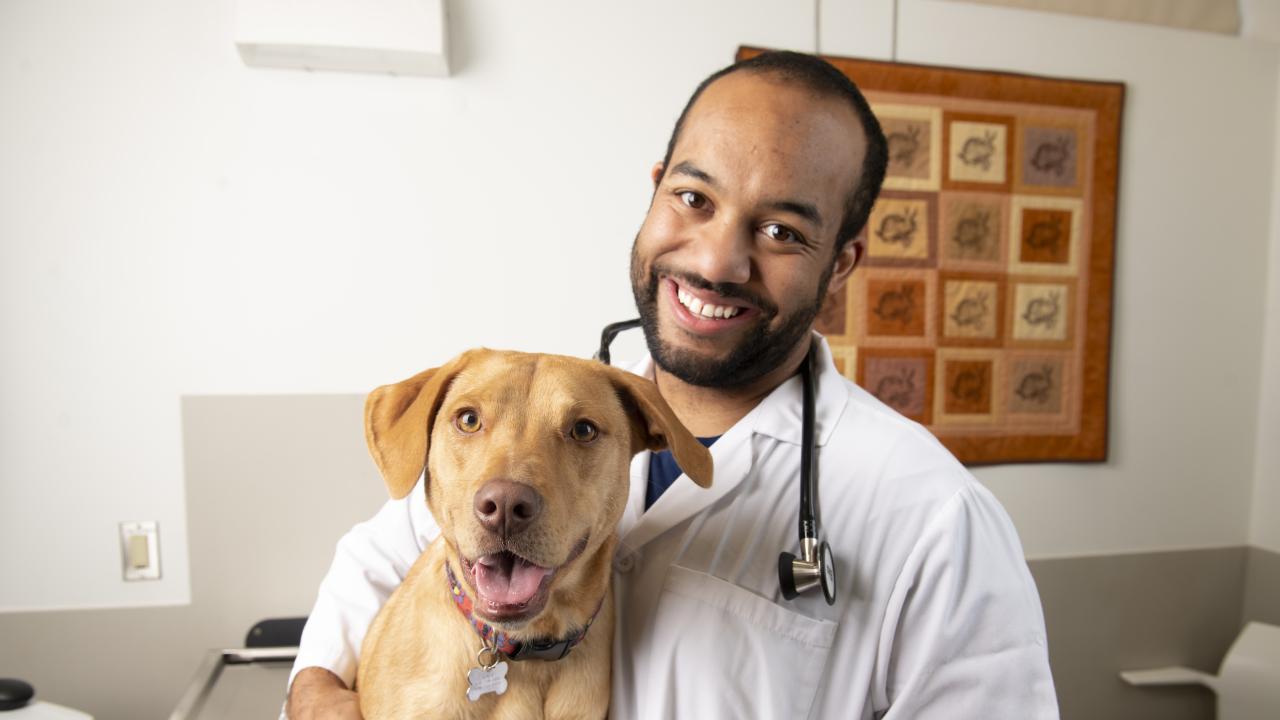How a Veterinary Oncologist Can Aid Improve Your Pet dog's Lifestyle
Vet oncologists concentrate on the medical diagnosis and therapy of cancer in animals, playing a crucial duty in boosting their lifestyle. They develop individualized treatment plans that address the one-of-a-kind requirements of each animal. With advanced diagnostics and targeted therapies, these professionals intend to take care of signs and symptoms effectively. However, the trip does not finish there. Exploring the complete range of care options reveals even more concerning just how these experts can make a substantial distinction.

Recognizing the Role of a Vet Oncologist

Along with diagnosis, veterinary oncologists establish extensive therapy approaches tailored to the requirements of each pet. These methods might include radiation treatment, radiation therapy, and surgical treatments, focused on not only expanding survival but likewise improving the total lifestyle. They offer palliative care, focusing on pain monitoring and convenience for animals encountering incurable diagnoses. By collaborating with animal proprietors, vet oncologists assure that pets receive the most efficient and caring treatment feasible throughout their cancer cells trip.
Customized Therapy Strategies for Your Pet
When an animal is identified with cancer cells, creating a tailored treatment strategy becomes essential for addressing their distinct needs and situations. A veterinary oncologist very carefully examines the kind of cancer cells, its stage, and the general health and wellness of the animal. This complete evaluation enables for the development of a personalized approach that might include a mix of surgical treatment, chemotherapy, and radiation therapy.
The oncologist also considers the pet proprietor's preferences and lifestyle, ensuring that the strategy lines up with their goals for their pet dog's care. Veterinary Oncology Services. Treatment strategies are not static; they are frequently reviewed and adjusted based upon the pet dog's feedback and any type of emerging needs. By concentrating on customized care, veterinary oncologists intend to improve the efficiency of therapies while preserving the animal's lifestyle. This tailored technique promotes a better understanding of the condition, equipping pet proprietors to make enlightened decisions concerning their cherished companions' health and wellness
Taking Care Of Signs And Symptoms and Negative Effects
Handling the signs and negative effects of cancer cells therapy is a vital element of vet oncology. Veterinary oncologists use a selection of techniques to ease discomfort and improve the total well-being of family pets undertaking treatment. This might include using anti-nausea drugs to combat vomiting and loss of cravings, which are common negative effects of radiation treatment. Discomfort management is likewise focused on, usually entailing the prescription of anesthetics tailored to the animal's certain requirements.
Furthermore, oncologists may recommend dietary changes, incorporating premium, quickly digestible foods to support dietary consumption. Monitoring blood job is crucial to find any type of unfavorable reactions to therapy early, enabling prompt interventions. Normal follow-ups allow the veterinary team to analyze the family pet's feedback to treatment and make required adjustments. Via these complete techniques, veterinary oncologists aim to improve the lifestyle for family pets facing cancer cells therapy challenges.
Palliative Treatment and Comfort Actions
Palliative treatment plays an important role in boosting the quality of life for family pets identified with cancer cells, concentrating on comfort and psychological assistance as opposed to alleviative treatment. Vet oncologists focus on pain management, guaranteeing that animals experience minimal discomfort throughout their health problem. This includes the usage of analgesics, anti-nausea medications, and other treatments tailored to specific needs.
In enhancement to pharmacological treatments, environmental alterations can significantly boost an animal's lifestyle. Developing a calmness, comfy space with soft bed linens and easy accessibility to food and water can reduce stress. Nutritional assistance is also crucial; oncologists may suggest specialized diet plans that satisfy the pet's preferences and requirements.
Psychological assistance for both the animal and its proprietors is crucial. Veterinary oncologists give guidance on dealing approaches, helping families navigate the psychological obstacles that come with a cancer cells medical diagnosis. Ultimately, palliative care objectives to ensure that family pets get the self-respect and convenience they deserve.
Collaborating With Your Routine Veterinarian
Partnership with a routine vet is necessary for Pet Cancer Surgery maximizing the treatment of pet dogs with cancer, as this collaboration guarantees a detailed approach to treatment and quality of life. The routine veterinarian generally has a comprehensive understanding of the family pet's medical history, which is crucial when developing a therapy plan. They can efficiently communicate with the vet oncologist, guaranteeing that all elements of the family pet's health are taken into consideration.
This collaboration enables collaborated treatment, which might consist of normal exams, keeping track of negative effects, and changing medicines as required. Normal vets can additionally give psychological support to pet dog proprietors, helping them navigate the intricacies of cancer treatment - Veterinary Cancer Specialist. By working closely with vet oncologists, they can promote a smooth shift in between different kinds of care, making certain that pet dogs obtain one of the most efficient treatments while preserving their comfort and well-being throughout the process. Together, they boost the total top quality of life for family pets dealing with cancer
Frequently Asked Inquiries

What Kinds of Cancers Do Veterinary Oncologists Usually Deal With in Family Pets?
Veterinary oncologists usually deal with various cancers cells in pet dogs, including lymphoma, mast cell lumps, osteosarcoma, and soft tissue sarcomas. These specialists use advanced analysis methods and treatment alternatives to deal with the specific requirements of each animal.
Just How Can I Prepare My Animal for a Vet Oncology Visit?
Preparing an animal for a vet oncology visit entails event clinical documents, keeping in mind signs and symptoms, and preparing inquiries. Guaranteeing the pet dog is comfortable and tranquil throughout traveling can also substantially boost the general experience and assessment effectiveness.
Exist Any Type Of Different Therapies for Pets With Cancer?
Different treatments for family pets with cancer usually include acupuncture, natural medication, and nutritional assistance. These strategies may match standard treatments, potentially boosting total well-being and supplying encouraging care during the animal's cancer cells trip.
How Typically Should My Pet Dog See the Vet Oncologist?
The frequency of visits to a veterinary oncologist normally relies on the pet's particular condition and treatment plan. Routine analyses might be recommended every few weeks or months to keep track of progression and readjust therapies accordingly.
What Expenses Are Related To Vet Oncology Providers?
Costs connected with veterinary oncology services can vary commonly, consisting of initial assessments, analysis examinations, therapy strategies, and continuous treatment. Veterinary Cancer Specialist. Pet dog proprietors should prepare for potential costs that show the complexity and duration of the treatment needed
Veterinary oncologists specialize in the diagnosis and treatment of cancer in animals, playing a crucial role in boosting their top quality of life. Many pet owners might not be acquainted with the intricacies of vet oncology, comprehending the role of a veterinary oncologist is necessary for managing cancer in family pets. The oncologist additionally thinks about the family pet proprietor's preferences and lifestyle, making sure that the strategy aligns with their goals for their animal's treatment. By concentrating on individualized care, vet oncologists aim to improve the performance of treatments while maintaining the family pet's quality of life. By functioning very closely with veterinary oncologists, they can help with a seamless change between various types of treatment, guaranteeing that animals obtain the most efficient treatments while keeping their comfort and health throughout the process.